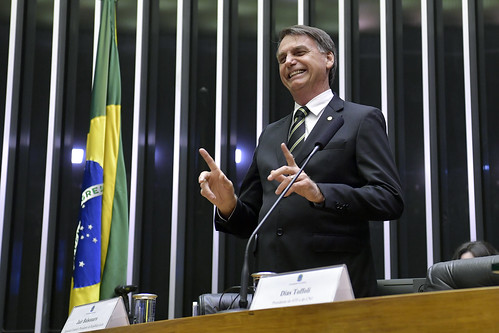A presidential candidate, soon-to-be president-elect, launches repeated attacks on press outlets critical of his proposals and his actions, accusing everything he does not like of being false. In contrast, he chooses outlets that will support him and who are willing to ask less troublesome questions as his spokespeople. And he uses Twitter, Facebook and other social networks to communicate directly with his supporters, encouraging them to privilege the "friendly" press and not to believe in "enemy" media.
This scenario that characterized the United States of Donald Trump in the last two years seems to be repeated now in Brazil by Jair Bolsonaro. Elected president on Oct. 28, Bolsonaro takes office on Jan. 1, 2019. He has followed the playbook of his North American colleague, keeping Brazilian and international organizations that defend freedom of expression and of the press on alert.
Brian Winter, editor-in-chief of Americas Quarterly magazine and vice president for policy at the Americas Society/Council of the Americas, believes the parallels between Bolsonaro and Trump are "quite close and completely intentional." "Bolsonaro has openly copied tactics from Trump because he’s seen how effective they can be," Winter told the Knight Center.
Among the tactics are the battle against what the North American and the Brazilian call "fake news," “even when it’s not really fake,” Winter observed. “In both cases, they have some legitimate cause for grievance – the mainstream media does, generally speaking, have some political or ideological bias against them. But they have also cynically used this cry to cast doubt on facts, and also to create their own – often fake – narratives among their supporters.”

President-elect of Brazil, Jair Bolsonaro has made disparaging remarks about the Brazilian press on at least 149 occasions in 2018, according to Folha. (Marcos Brandão/Senado Federal)
Attacks on the press, assaults on journalists
Brazilian and foreign journalists covering the presidential elections in Brazil have been the target of aggressions, as registered by the Brazilian Association of Investigative Journalism (Abraji). According to the association, Bolsonaro supporters are the perpetrators of most of the 153 acts of violence (72 physical and 81 digital) against journalists in the electoral context recorded since the beginning of the year.
Several journalists who have written reports critical of Bolsonaro have been the target of coordinated attacks on social networks, with insults and threats of physical violence and even death. Some had their accounts on the WhatsApp messaging application hacked and their contacts deleted. On the day of the second round of the election, at least nine journalists were verbally or physically assaulted while doing their work, according to Abraji, including foreign correspondents.
One of these aggressions came from Bolsonaro's press officer. Carlos Eduardo Guimarães sent a message to a WhatsApp broadcast list with reporters calling the press a "ruse" and "scum." The case was reported by several newspapers, such as O Globo and Gazeta do Povo. After negative repercussions, the officer apologized publicly, as reported by Agência Brasil.
Bolsonaro himself, according to Folha de S. Paulo, has made disparaging remarks about the Brazilian press on at least 149 occasions since the beginning of the year – 45 just in October, the month of the elections. The newspaper analyzed posts on social networks, pronouncements and interviews of the then-candidate and concluded that he accused the press of falsehood 39 times and of partisanship 38 times, and on 49 occasions sought to stimulate distrust in the press.
Folha has been the outlet most publicly criticized by the president-elect. The newspaper claims to have been targeted by 36 attacks from Bolsonaro. After Folha, the outlets most criticized by the future president are from Grupo Globo – TV Globo, GloboNews channel, O Globo newspaper and Época magazine – with 27 derogatory mentions.
Although Bolsonaro made most of these statements before his election, the day after his victory at the polls, the president-elect reiterated in an interview with TV Globo's Jornal Nacional that he intends to withdraw official advertising from Folha and press outlets that, according to him, are "lying shamelessly." He also stated that Folha "no longer has any prestige" and "on its own, this newspaper is over."
"These are statements that are not normal for a president-elect," Emmanuel Colombié, regional director for Reporters Without Borders (RSF) in Latin America, told the Knight Center.
"The incitement to hatred and the aggressive declarations against the press marked the victory of Jair Bolsonaro. Obviously we respect the vote and the fact that he has been elected democratically, but this climate of hatred is a bad omen for this new era inaugurated in the country," Colombié said, adding that RSF is "very worried" and is preparing for "complicated years".
Abraji also said it had received Bolsonaro’s statements after his victory in the polls with "apprehension." "Respect for the Constitution – to which the president will take a solemn oath of obedience on Jan. 1, 2019 – is not complete when the press becomes the object of attacks and threats," the entity said in a statement released on Oct. 30.
To the Knight Center, Daniel Bramatti, president of Abraji, noted that "the president-elect, throughout his career as a congressman, at times expressed contempt for democratic values that Abraji considers fundamental. We hope that, as president, he will turn around."
The association also expects Bolsonaro, "as well as any holder of public office, to respect the role of journalism as an activity that encourages debate, oversight and criticism," Bramatti said. "The president's relationship with the press must still be marked by impersonality. If this is not the case, Brazil will be compared to countries with repressive regimes that see in good journalism an enemy to fight."

Bramatti, president of Abraji: association expects Bolsonaro "to respect the role of journalism as an activity that encourages debate, oversight and criticism,". (Alice Vergueiro/Abraji)
Daniel
The president of Abraji said that the association’s priorities under the future Bolsonaro government will remain the same since its founding: "to defend freedom of expression (including the safety of journalists), to promote transparency of public power and to encourage professional improvement. In short, to collaborate with the improvement of journalism in order to contribute to democracy."
RSF has said that protecting journalists against physical attacks and digital attacks will be one of the organization's priorities. "How to help journalists, communicators and bloggers who are attacked by Bolsonaro’s supporters, what tips, what recommendations, how we can help the communicators who will continue to denounce, criticizing the work of the administration," Colombié said.
Both RSF and Abraji released publications in 2018 with guidelines for communicators who are targeted by virtual harassment on social networks.
Censorship and boosted subscriptions are possible effects
In addition to the obstacles that may be imposed on journalists in carrying out their work, or physical and virtual attacks on the professionals responsible for reports that displease the president-elect and his supporters, there is also the possibility of censorship, RSF warns.
"There are presidents-elect in many so-called democratic countries that censor the press," Colombié said. "In Latin America we have many examples and Brazil could become a model of institutional censorship through various measures." One of them could be the withdrawal of official advertising to press outlets critical of the government, as Bolsonaro has already threatened, the regional director of RSF recalled.
Winter stressed that "freedom of the press is not just restricted through changes to the laws – it can be damaged through threats and self-censorship as well.”
 Brian Winter (right) interviewed Jair Bolsonaro in October 2017 and wrote a profile of the then candidate for Americas Quarterly. (Americas Quarterly)
Brian Winter (right) interviewed Jair Bolsonaro in October 2017 and wrote a profile of the then candidate for Americas Quarterly. (Americas Quarterly)
Looking at the situation in the U.S., Winter assesses that journalists in his country have not yet figured out how to cover Trump the “right” way. “One obvious conclusion based on the U.S. experience would be to avoid letting Bolsonaro dictate the news cycle with his latest controversy or outrageous comment.”
Trump has achieved this in the U.S., which benefits him, in Winter's assessment, because his supporters are encouraged to see the big media scandalized and because this coverage takes focus from more important questions related to the government.
But it’s easier said than done, acknowledges the editor-in-chief of Americas Quarterly: “part of the journalism profession inevitably revolves around reporting on what a president said, especially when it is so different from what we're used to hearing from the nation's highest office.”
Both the editor-in-chief of Americas Quarterly and Abraji’s Bramatti said they believed that a positive side effect in this context could be the strengthening of the independent press, as happened in the United States.
“Both countries have a strong, vibrant press,” Winter said. “In the United States it's clear that the Trump administration has – unintentionally – reinvigorated a media that had been suffering for years from declining market share and circulation. I think there are chances of a similar phenomenon occurring in Brazil, although it's worrying that several media companies are in dire financial shape.”
He also warns that if Bolsonaro continues to target Folha, it can help the newspaper increase its audience and subscriber numbers – just as Trump did for the "failing New York Times," in the words of the U.S. president. Folha has already reported a "spontaneous campaign to defend the newspaper," with posts on the social networks from public figures and citizens encouraging newspaper subscriptions.
“The so-called ‘Trump bump’ helped drive 300,000 new digital subscriptions for the NYT in the quarter following his inauguration,” Winter said. “If Bolsonaro really wants Folha to be "over" – as he has said – then he should really stop talking about it!”